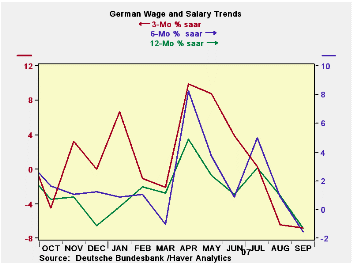 Global| Nov 19 2007
Global| Nov 19 2007German Wage and Salary Trends Turn Lower…
Summary
German wages and salaries are losing momentum. In inflation-adjusted terms the slow down is substantial and has turned real trends negative over the past year. The downward pressure is not abating. In September nominal wages and [...]

German wages and salaries are losing momentum. In inflation-adjusted terms the slow down is substantial and has turned real trends negative over the past year. The downward pressure is not abating. In September nominal wages and salaries per hour (including construction) fell by 0.7%. In that same month the HICP rose by 0.7%. The real wage dropped by 1.4% a bit slower than their 2% drop in August but more severe than in July - all are m/m calculations. Yr/Yr nominal wages and salaries per hour are lower by 1.3%; in real terms they are lower by a stunning 4%. Over three months the annualized rate of decline is greater still.
| German Wage and Salary Trends | ||||||
|---|---|---|---|---|---|---|
| Sep-07 | Aug-07 | Jul-07 | 3-Mo | 6-Mo | 12-Mo | |
| Wages & Salaries | -0.7% | -2.1% | 1.0% | -6.8% | -1.6% | -1.3% |
| Real Wages & Salaries | -1.4% | -2.0% | 0.9% | -9.9% | -4.7% | -4.0% |
| Wages & Salaries less HICP on same tenor | ||||||
Robert Brusca
AuthorMore in Author Profile »Robert A. Brusca is Chief Economist of Fact and Opinion Economics, a consulting firm he founded in Manhattan. He has been an economist on Wall Street for over 25 years. He has visited central banking and large institutional clients in over 30 countries in his career as an economist. Mr. Brusca was a Divisional Research Chief at the Federal Reserve Bank of NY (Chief of the International Financial markets Division), a Fed Watcher at Irving Trust and Chief Economist at Nikko Securities International. He is widely quoted and appears in various media. Mr. Brusca holds an MA and Ph.D. in economics from Michigan State University and a BA in Economics from the University of Michigan. His research pursues his strong interests in non aligned policy economics as well as international economics. FAO Economics’ research targets investors to assist them in making better investment decisions in stocks, bonds and in a variety of international assets. The company does not manage money and has no conflicts in giving economic advice.
More Economy in Brief
 Global| Feb 05 2026
Global| Feb 05 2026Charts of the Week: Balanced Policy, Resilient Data and AI Narratives
by:Andrew Cates






